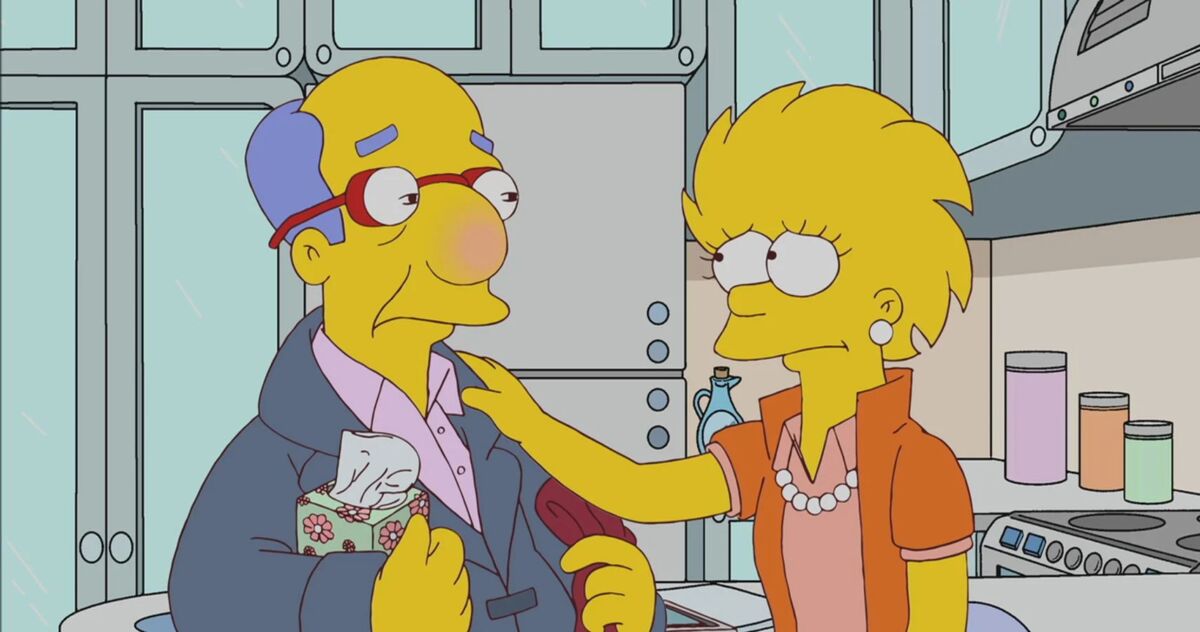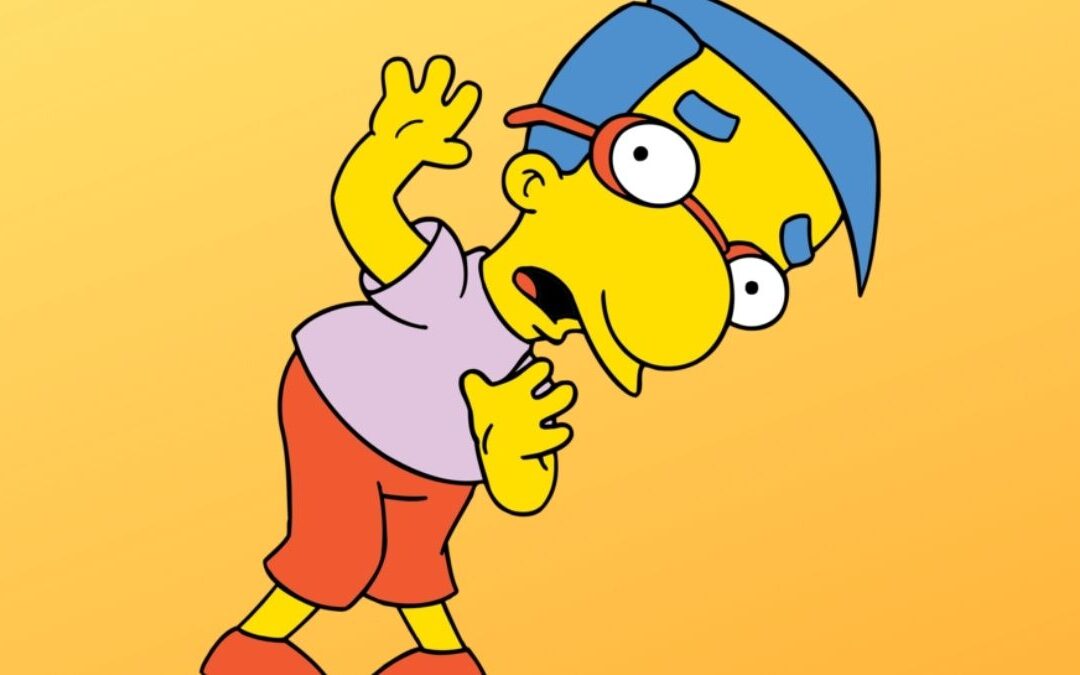There was an aside in one episode of The Simpsons where Lisa Simpson – in a bout of the inevitable insecurity of the gifted child – imagined herself in a supergroup alongside Art Garfunkel, Jim Messina, and John Oates, playing “their number two hit, ‘Born To Runner-Up’”. Of course, for a smart and capable cookie like Lisa, these feelings of inadequacy were particularly notable because they were so unusual. But for her wannabe-amour Milhouse Van Houten, being born to runner-up is simply a baseline way of life.
Milhouse is, of course, Bart Simpson’s best friend, a relationship that’s lopsided at the best of times. It hardly needs repeating that Bart was the show’s breakout star – remember the early ‘90s? Remember Bartmania? No child star short of Maisie Williams could have hoped to top that, and Milhouse is no Maisie Williams. Milhouse’s greatest personal impact on the wider culture came in the mid-2000s, in those first heady days of meme culture, and his slice of that was the phrase ‘Milhouse is not a meme’.
So Bart was by nature more prominent. He had the adventures, and occasionally Milhouse was…also there. Even in those episodes which had Milhouse front and centre, it was usually coming through Bart’s lens, and if not his then Lisa’s. Often, he was simply referred to as ‘Bart’s friend’. And even this rings slightly hollow, given that Bart has gone so far as to send the feds after Milhouse for a crime he didn’t commit, resulting in the boy having to jump from a dam à la The Fugitive.
True to form for a character who is by nature of the second tier, Milhouse didn’t start off on The Simpsons proper. Nor, even, was he part of the early shorts on the Tracey Ullman Show – Milhouse, poor sod, started life on a 1988 advertising spot for Butterfinger. Naturally, Bart had a Butterfinger and Milhouse didn’t, and from this their have/have-not dynamic was set forever.
In my analysis of Ralph Wiggum, the fact poor old Ralph has a significant cross to bear obviously came up a lot, but in his case this stemmed from the visceral fact of having some sort of neurological impairment (like Rain Man, or Awakenings). Milhouse has no such excuses, no single flaw to point to – he’s simply one of those people whom the gods cannot bear to see win, as if he committed unspeakable atrocities in some past life and is now unknowingly paying for it. In this way he’s a lot like a younger version of another of The Simpsons’ cosmic playthings, the similarly bespectacled Hans Moleman.
Moleman is more of a cartoon, more prone to stuff like falling off cliffs or being blown up, but Milhouse isn’t that far behind – I’ve mentioned his jump from the dam. He’s also the victim of violence from Springfield Elementary’s contingent of bullies in a more Tom-and-Jerry way than most. Where Bart might be punched, Milhouse would get covered with stickers and then hurled down a hill in a shopping cart, or be fed head-first into a bowling ball shine-o-matic (“Stop, you’re polishing bone!”).
He did, of course, start off from incredibly poor footing. Any child born nebbish, specky, and big-nosed would have fared badly in the wretched shark tank that is the school system. Milhouse bore the additional indignity of having been christened with the middle name of one Richard M. Nixon, former President and go-to villain for the children of the ‘60s and ‘70s who created The Simpsons. And, of course, his awful parents publicly and explosively divorced – although this resulted in the excellent twist of the bullies, themselves no strangers to broken homes, all sincerely sympathising (“My divorce was tough on my kid, but he got over it”).
Milhouse’s desperate, doomed crush on Lisa was the very picture of the traditional friend-zoning. As with Ralph, Lisa simply didn’t feel the same way – for reasons which are, in both cases, all too obvious. Milhouse, though, had to bear the additional indignity of seeing Lisa develop her own crush on his perennial tormentor Nelson Muntz. Like a few too many misguided men and boys, he’d somehow picked up the idea that aiding her in this romantic pursuit would, through topsy-turvy voodoo logic, make her interested in him instead. As his internal monologue puts it, “When she sees you’ll do anything she says, she’s bound to respect you”.
Curiously, some of the flash-forward episodes suggest that Lisa and Milhouse later dated for a while – and, perhaps, did more. Before the abortive main event of ‘Lisa’s Wedding’, Lisa objected to wearing white because of Milhouse, only for Marge (interestingly, another of Milhouse’s hopeless crushes) to immediately quip “Milhouse doesn’t count”. So we can take it that something in the rough area of sex did happen, though we can only assume it was as humiliating as the rest of Milhouse’s life. Would it be wrong to speculate that the teen Milhouse, in some awkward fumbling encounter with his dream girl, ejaculated prematurely? Perhaps, but you can’t tell me it’s not funny.

Eventually, returning to an increasingly diminished well, some of the flash-forwards would have Lisa and Milhouse not simply get together, but actually get married and have a child. Non-canon they may be, but they represent both characters acting in a way that stretches the imagination: Lisa is clearly settling, but then so is Milhouse, tying the knot with a woman who by then he must be well aware doesn’t really desire him.
But in a way, we’d already seen how easily that could be Milhouse’s windblown future – because of the similar path taken by his parents, Kirk and Luann Van Houten. The characters were clearly first sketched late on a Friday, since they were little more than an older version and an older female version of Milhouse respectively (suggesting a weird incestuous vibe). As mentioned above, they divorced in the eighth season, but even at the best of times they never seemed all that close: a season six episode revealed they slept in separate beds, the exact kind of dynamic a Lisa/Milhouse pairing would probably come to quite quickly.
Kirk was a Death of a Salesman-style image of failed masculinity, in many ways prefacing Springfield’s hapless all-purpose dogsbody Gil. His career as a “pretty big wheel at the cracker factory” came to an end as part of the conga of humiliation his divorce prompted. Even Milhouse knew, when Bart hired him as nightwatchman at a defunct factory, that “at least I’ve done better than dad”. Oddly, Luann, once freed from the shackles of that terrible marriage, ended up dating a string of Chippendales and gladiators, despite having Milhouse’s face on the body of a grown woman.
But this essay is about Milhouse, not his awful parents – although they’re about average for the adult authority figures Milhouse had to suffer. When his slinky failed to demonstrate gravity (“in all its glory”), even Mrs. Krabappel declared it “pretty lame”. She may have been right, but it’s hardly Milhouse’s fault that physics chose to take the day off. Springfield’s resident child psychologist, Dr. J. Loren Pryor, variously diagnosed Milhouse as being “flamboyantly homosexual” and a future “military strongman” – which, written in the time of Don’t Ask, Don’t Tell, is more an illustration of Pryor’s own incompetence than anything about Milhouse’s psyche.
And Homer Simpson, in particular, hated “that little wiener Milhouse”. Surprisingly, this had nothing to do with Milhouse’s designs on the man’s daughter, which Homer didn’t even seem aware of. When Bart drew the dud playing the ‘Mystery Date’ board game, Homer was quick to delightedly crow “he looks just like you, poindexter!” at Milhouse. And it did seem to be Milhouse being friends with Bart that actually bothered Homer – despite his own fairly turbulent relationship with his son, he apparently believed Bart deserved better. Sure enough, when he needed to send his father into a screaming rage, Bart simply had to say “the other day, I was a little attracted to Milhouse”.
Against this tragicomic backdrop, Milhouse’s attempts to exercise any kind of self-assertion became cringe-makingly laughable in and of themselves. Sitting in a jump-jet during an airbase open day, he immediately launched an imaginary strafing run against his own parents (“Send me to a psychiatrist, will you?…Take that, Dr. Sally Waxler!”). Playing the ultra-violent Mortal Kombat-alike ‘Bonestorm’, he chose the username ‘Thrillhouse’, rendered ‘THRILLHO’ by the low ‘90s resolution. Posing like a muscleman in a mall photo booth, when interrupted by an FBI agent (who he does seem to have awful luck with) he was forced to blushingly explain “My shirt fell off”. Even something as simple his desperately sincere imitations of water sprinklers became another damp-squib failure on his long list.
https://www.youtube.com/watch?v=J3FlRz4Ps8c
And yet, with such low standards, it’s not too hard to wangle a win. Even that doesn’t come often, but when it does, it sticks with you. This essay’s title comes from Milhouse’s experience of one of Springfield’s semi-regular disasters. To his disgust, he’s having to put on his hated ‘flood pants’ – but then, when the waters breach his bedroom door, it turns out that “they’re working! My feet are soaked, but my cuffs are bone-dry! Everything’s coming up Milhouse!”
The whole low-key horror of being Milhouse was summarised quite neatly in ‘Lemon of Troy’, in one of the recurrent feuds between Springfield and their hated neighbouring town Shelbyville. The obvious joke of this clannishness is that they’re basically the same place – there’s a montage that takes in the Speed-e-Mart, Joe’s Tavern, and a gender-flipped Groundskeeper Willie. But when Milhouse meets his own doppelgänger, also called Milhouse, and declares “But I thought I was the only one!” it says more of his quiet despair than any number of shirts falling off.
(We get a similar moment in ‘You Only Move Twice’, when the Simpsons move away from Springfield, and Bart is almost immediately approached by a slightly sleeker Milhouse, who greets him with “H-hey Bart, do you have a best friend yet? Because I’ve been looking for someone to boss me around!”)
From the inside, the experience feels so uniquely dreadful, how could anyone else possibly understand what it is to be Milhouse? And yet, at the end of the day, even the bearers of that oblique cross need not suffer alone. Others, too, get sidelined by their generally superior friends. Others, too, find themselves the eternal dud, barely registering on the radar of their crush. A few too many others find themselves unjustly pursued by the feds. And others, too, now and again have things finally, mercifully, come up Milhouse.
For one quiet, tiny victory to rise up out of the general sludge of one’s life – not even anything big, not even a real net gain, just a momentary cessation of all the awfulness which of course you’ll then cling to like a lifebelt – hell, every second-stringer who’s always finding themselves a day late and a dollar short knows that feeling. This is what Milhouse has given the world, representation for that demographic, a demographic who by nature don’t get a lot of breaks and aren’t ready TV fodder. Truly, this is what it’s like when doves cry.
READ NEXT: Ned Flanders, My Friend: A Look Back At The Simpsons’ Neighbour
Some of the coverage you find on Cultured Vultures contains affiliate links, which provide us with small commissions based on purchases made from visiting our site.

